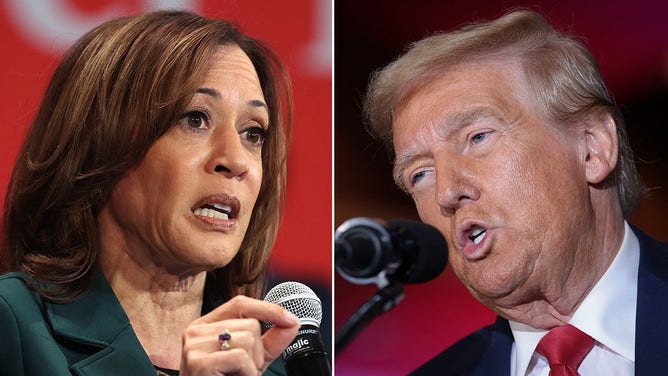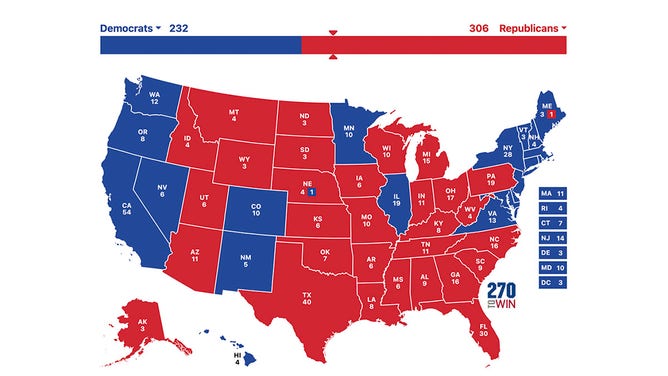Let's Try To Find An Election Favorite Between Kamala Harris And Donald Trump, Two Weeks Out | Bobby Burack
Fourteen days out, most mainstream polling agencies consider the presidential election a toss-up. Donald Trump and Kamala Harris are split well within the margin of error in the seven battleground states.
The betting market – which was more accurate than public polling in 2016 and 2020 but notably off during the 2022 midterms – favors Trump considerably. Polymarket, the most cited betting aggregator for the election, currently gives Trump a 63% chance of victory.
Trump leads Harris in each battleground state via RealClearPolitics averages, recently pulling ahead of the vice president in Wisconsin. But the margins as of Tuesday morning are thin and as follows:
- Arizona: Trump, +1.8
- North Carolina, +0.5
- Georgia: Trump, +2.5
- Michigan: Trump, +1.2
- Pennsylvania: Trump, +0.8
- Nevada: Trump, +0.7
- Wisconsin - Trump, +0.4
Now, to the models.
Nate Silver's updated election model on Monday, based on some 40,000 simulations, found Trump victorious 52.7% of the time. Silver's model has often been at odds with the calculations of FiveThirtyEight, the site he founded in 2008. However, FiveThirtyEight's most recent calculations also give Trump about a 53% chance of winning the election.
The gender gap looms large.
According to NBC, Trump is currently polling +16 with likely male voters, while Harris is up +14 in the inverse. That is a gender gap of 30 points, which would be a record if proven true on election day.
The election might simply come down to which candidate can slightly narrow the gender gap in favor of them in a few of the battleground states. Neither has found much success in doing so.
So, who has the advantage?
We hope to answer that question by the end of the article.
In short, any outcome is on the table. At this point, no result should shock you. Trump could win narrowly. He could win comfortably. Harris could win a 270-268 race. She could also win with well over 300 electoral votes.
Let's assume there are no upsets outside elsewhere (there shouldn't be). Harris essentially begins with 226 electoral voters, while Trump begins with 219.
You can see a visual below:

It is all about Pennsylvania, right?
Not necessarily. Well, maybe. Err, most likely.
Pennsylvania holds 19 electoral votes, the highest of any battleground state. Pennsylvania has voted for the nationwide winner in 47 out of 59 presidential elections, giving the winner of Pennsylvania an 80% success rate.
However, a Democratic candidate (based on the +7 pre-battleground advantage) could lose Pennsylvania but still win the election by securing Michigan, Wisconsin, North Carolina, and one of the Sun Belt states. With the margins so thin, such a scenario cannot be ruled out.
But … we don't see it.
To do so, the candidate would have to break up the Rust Belt swing states. Don't bet on it. Michigan, Wisconsin, and Pennsylvania have voted as a unit in every presidential election since 1992.
The good news for Kamala is that the three states have become known as the "Blue Wall." The title is fitting. The trio of Great Lakes swing states has voted for the Democratic candidate in every election since 1992, except for 2016.
The good news for Trump is that he was the candidate who bucked that trend eight years ago, winning the trio.
In other words, the winner of Pennsylvania will probably win the election. The question is which candidate?

Doesn't running for the incumbent party give Kamala Harris an advantage?
Actually, no.
Running for the incumbent party is arguably a disadvantage.
As Nate Silver noted over the weekend, "Incumbent parties worldwide are doing very poorly, and the historical incumbency advantage has diminished to the point where it may now be an incumbency handicap instead, given perpetually negative perceptions about the direction of the country."
Especially in America.
Happiness in America is at an all-time low. It's natural and usually fair to blame leadership for that feeling.
Moreover, the nationwide view of the current incumbent party is overwhelmingly negative. According to CNN polling, just 28% of voters say America is "on the right track." An incumbent party has never won a presidential election when the number is below 39%. Harris would have to be a historical outlier.
Harris would also have to overcome Trump's advantage in terms of voter trust on key election issues. Recent Wall Street Journal polling of the seven battleground states found that voters trust Trump more than Harris on the economy, cost of living, immigration, and finding a resolution to Russia’s war with Ukraine.
Abortion and Jan. 6 appear to be the only winning messages Harris has.
Are those two issues enough?
The heads of the Democratic Party aren't confident. NBC News chief political analyst Chuck Todd, whose sources within the party are strong, reported the following over the weekend about Biden's final days as a re-election candidate:
"Biden simply didn’t have a winning hand to run on. All he had was harnessing backlash over Jan. 6 and abortion, and while both issues do resonate with a significant chunk of the electorate, those two issues alone couldn’t get him to the finish line."
Nearly three months later, the Harris campaign has failed to establish a third issue to run on. So, it's all abortion, women's rights, threat to democracy, and Hitler.
Rinse and repeat.
So, Trump winning narrowly is the most likely, right?
Well, not exactly "narrowly."
Even if the number of votes that separate the candidates is narrow, recent history suggests the victorious candidate is going to win at least five swing states. The winning candidate has secured at least 300 electoral votes in every presidential election since 2004.
See, the razor-thin margins do not necessarily indicate a tightly contested electoral college. For example, mainstream polling underestimated Trump by about five points in the last two elections. If that's the case this year, Trump would go 7-for-7 in the swing states.
Perhaps the polls are underestimating support for Harris. It's unlikely, but it's not impossible. If so, she could take six of seven swing states, as Joe Biden did four years ago.
Don't be surprised if one of the candidates wins the electorate comfortably – or at least as comfortably as one can in 2024.
My prediction, 14 days out: Cost of living will ultimately be Kamala's undoing. Trump will win Michigan, Wisconsin, Pennsylvania, Georgia, Arizona, and North Carolina, for a 306-232 victory:

Let me know your thoughts on X, @burackbobby_.